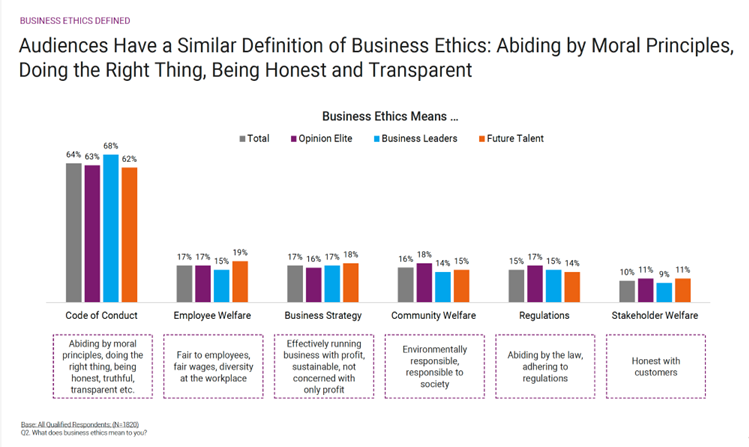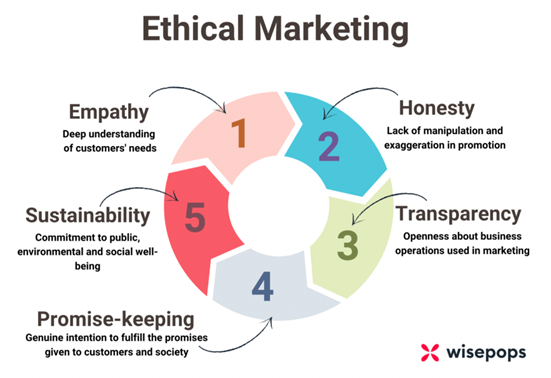"Ethical marketing practices." Surely the phrase is an oxymoron. Or is it?
Today, many people want to be more environmentally and ethically conscious when making product purchases.
At the same time, many businesses are considering ways to transform corporate social responsibility (CSR) initiatives into more comprehensive environmental, social, and corporate governance (ESG) practices they can place at the core of their business model.
It makes sense that businesses move with the times and change how they market their brand.
Business ethics has always been an important concept. But considering recent changes in customer expectations, it is even more essential that the way organizations market themselves in the modern world be more genuine than ever.
To be successful in the long term, businesses must adhere to higher ethical standards.
But how do you switch to ethical marketing practices from a more traditional model? How do you ensure your messages aren't greenwashed or don't mislead your B2B customers?
And what does "ethical marketing practices" even mean?
What Are Ethical Marketing Practices?

Source: aicpa-cima.com
In short, ethical marketing is a strategy that prioritizes responsibility, transparency, and trust in all marketing collateral and campaigns. Essentially, it shows that a business is willing to put fairness and value over generating profit.
Ethical marketing goes hand in hand with business ethics. Modern businesses increasingly emphasize ethical practices—from employee, community, and stakeholder welfare to code of conduct and business strategy. As a result, they'll no doubt want to communicate their responsible stance to clients to foster trust, improve the company's reputation, and set themselves apart from competitors.
Clients and customers are becoming increasingly savvy, though. They understand the market and have high expectations regarding everything from value for money to customer service.
But rather than telling clients what they want to hear (even if it's not strictly correct), a responsible company will stick to the truth. Therefore, ethical marketing practices for businesses should take the following into consideration:
- Communication. Ethical marketing revolves around being genuine in communications—a practice that businesses of all sizes should already be following. Whether in a traditional advertisement or social media post, avoid disingenuous or misleading information and exaggerated claims; always include details that are pertinent to the legal use of a product or service. Focus on the value your business brings to customers and the positive impact it has on stakeholders.
- Pricing. Businesses want to price products competitively or set themselves apart as a higher-end service provider through a luxury pricing model. But marketing your business ethically means avoiding dominating the market.
- Legal obligations. From marketing codes of conduct to data protection laws, there are various legal considerations that ethical businesses must adhere to. It's essential that you're not only aware of these but also use your marketing strategy to inform clients about your practices. That might include data management and right of ownership.
- Social media. Companies are increasingly turning to social media platforms to generate leads. While it's tempting to tap into trends that will increase your reach, it's crucial that any paid ads or posts are a true reflection of your brand's ethical practices and product offering.
Keep in mind that ethical marketing can encompass a wide range of actions that vary according to the sector, product, or service. For example, with some B2B software, clients may want to better understand how you collect and store employee data and know they can request access to confidential information at any time.
If your marketing is honest, clients are more likely to trust your brand and build a long-term relationship with it, which is crucial in the B2B landscape. That approach can cover everything from the advertising you create to the information given by agents in your omnichannel contact center.
It's possible to use machine-learning models to identify changes in client expectations and needs, which can also inform your marketing strategy thereafter.
One way to move toward ethical marketing practices is to ethically harness artificial intelligence to better understand behavior. AI can help identify patterns and trends in your industry, which can inform your marketing strategy and ensure you are meeting the evolving needs of your target audience.
In addition, email tracking can provide valuable insights into how people engage with your marketing messages, helping you optimize email campaigns for maximum impact.
Ethical marketing practices should extend to all aspects of a company's operations, including its marketing collateral. It's essential to ensure that any claims made in marketing materials are accurate and transparent, and that any language used is not misleading or overly promotional.
By creating honest and informative marketing documents, you can build trust with clients, improve customer satisfaction, and foster long-term relationships based on transparency and authenticity.
Why Ethical Marketing Practices Matter

Source: wisepops.com
Trust sits at the heart of most business-to-business relationships. Although the quality of products or services and product value remain key factors in establishing trust, there's also a growing focus on social responsibility and environmental sustainability.
Your marketing efforts must therefore be transparent—to engender trust and increase customer engagement.
If your marketing is disingenuous, you will be found out. Business leaders talk to each other, so if your marketing claims don't live up to expectations, word will spread—and it could significantly damage your reputation.
Ask yourself how transparent or promotional your marketing content is. Today's managers will willingly walk away if they feel the content you put out is peppered with inaccuracies, mistruths, or exaggerations. And chances are there are plenty of competitors for them to choose from.
Two common examples of unethical marketing practices that you should steer clear of:
- Greenwashing: an organization (or its marketers) overstate how environmentally friendly a business is. Fully 58% of global executives admit their "green credentials" have been exaggerated.
- Wokewashing: a company uses a particular social cause in its marketing, even though it doesn't align with its core values. Its practices may even contradict the movement.
How to Move Toward Ethical Marketing Practices
One of the primary drivers of a business's marketing strategy is to give customers what they want (or what we think they want).
But as a marketer, you need to recognize the changing tastes and needs of your target demographic, as well as the evolving practices of the organizations you market for.
If you want to implement ethical marketing practices, base your efforts around these five core principles:
- Honesty: Go beyond your marketing messages; include other factors—practices such as returns management in e-commerce.
- Sustainability: Provide evidence that a business does, in fact, employ sustainable methods or use sustainable materials in its products.
- Empathy: Demonstrate that you understand customers' feelings and pain points; doing so will ensure your marketing practices are perceived as genuine.
- Transparency: People no longer accept things at face value. There needs to be total transparency in your messaging.
- Keeping promises: If you don't deliver on the promises made in your marketing, people will look elsewhere.
It could be said that all marketing, by its nature, is manipulative in some way. However, ethical marketing practices make that truism less true.
If you can honestly persuade customers that your brand is better because of its environmental impact or corporate governance, then you're not only achieving your business purpose but also contributing toward positive change in the wider world.
More Resources on Ethical Practices in Marketing and Business
Why Honesty and Integrity Pay: The Benefits of Truth-Based Marketing
How to Create a Socially Responsible B2B Marketing Campaign
A Guide to Business Ethics and Social Responsibility [Infographic]




